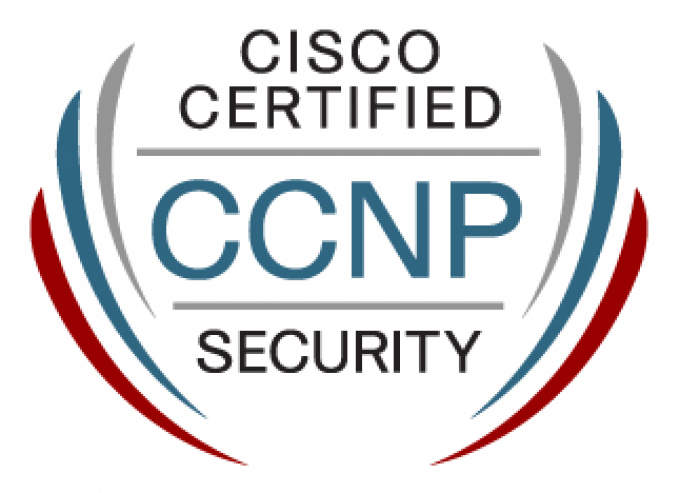Implementing and Operating Cisco Security Core Technologies Training Courses
- Description
- Schedule
- What You'll Learn
- Outline
- Prerequisites
- Income Expectations
- Next Step
- Tuition Fee
- Exam
Implementing and Operating Cisco Security Core Technologies Training Courses Classes
Implementing and Operating Cisco Security Core Technologies v1.0 (SCOR 350-701) is a 120-minute exam associated with the CCNP and CCIE Security Certifications. This exam tests a candidate's knowledge of implementing and operating core security technologies including network security, cloud security, content security, endpoint protection and detection, secure network access, visibility and enforcements. The course, Implementing and Operating Cisco Security Core Technologies, helps candidates to prepare for this exam.
The following topics are general guidelines for the content likely to be included on the exam. However, other related topics may also appear on any specific delivery of the exam. To better reflect the contents of the exam and for clarity purposes, the guidelines below may change at any time without notice.
SCHEDULE DATES - 40 Hour Program
Implementing and Configuring Cisco Security Core Technologies
9AM - 5PM (Weekdays)
Start Date & Graduation Date
04/04/2022 to 04/08/2022
5 Days (40 Hours) a Week for 1 Week
|
||||
Implementing and Configuring Cisco Security Core Technologies
9AM - 5PM (Weekdays)
Start Date & Graduation Date
05/16/2022 to 05/20/2022
5 Days (40 Hours) a Week for 1 Week
|
||||
Implementing and Configuring Cisco Security Core Technologies
9AM - 5PM (Weekdays)
Start Date & Graduation Date
07/18/2022 to 07/22/2022
5 Days (40 Hours) a Week for 1 Week
|
||||
Implementing and Configuring Cisco Security Core Technologies
9AM - 5PM (Weekdays) |
Start Date
Graduation Date |
04/04/2022
04/08/2022 |
5 Days (40 Hours) a Week for 1 Week | |
Implementing and Configuring Cisco Security Core Technologies
9AM - 5PM (Weekdays) |
Start Date
Graduation Date |
05/16/2022
05/20/2022 |
5 Days (40 Hours) a Week for 1 Week | |
Implementing and Configuring Cisco Security Core Technologies
9AM - 5PM (Weekdays) |
Start Date
Graduation Date |
07/18/2022
07/22/2022 |
5 Days (40 Hours) a Week for 1 Week | |
Implementing and Operating Cisco Security Core Technologies Training Classes
Security Concepts
Network Security
Securing the Cloud
Content Security
Endpoint Protection and Detection
Secure Network Access, Visibility, and Enforcement
Implementing and Operating Cisco Security Core Technologies Training Classes
Security Concepts
Explain common threats against on-premises and cloud environments
- On-premises: viruses, trojans, DoS/DDoS attacks, phishing, rootkits, man-in-the-middle attacks, SQL injection, cross-site scripting, malware
- Cloud: data breaches, insecure APIs, DoS/DDoS, compromised credentials
Compare common security vulnerabilities such as software bugs, weak and/or hardcoded passwords, SQL injection, missing encryption, buffer overflow, path traversal, cross-site scripting/forgery
Describe functions of the cryptography components such as hashing, encryption, PKI, SSL, IPsec, NAT-T IPv4 for IPsec, pre-shared key and certificate based authorization
Compare site-to-site VPN and remote access VPN deployment types such as sVTI, IPsec, Cryptomap, DMVPN, FLEXVPN including high availability considerations, and AnyConnect
Describe security intelligence authoring, sharing, and consumption
Explain the role of the endpoint in protecting humans from phishing and social engineering attacks
Explain North Bound and South Bound APIs in the SDN architecture
Explain DNAC APIs for network provisioning, optimization, monitoring, and troubleshooting
Interpret basic Python scripts used to call Cisco Security appliances APIs
Network Security
Compare network security solutions that provide intrusion prevention and firewall capabilities
Describe deployment models of network security solutions and architectures that provide intrusion prevention and firewall capabilities
Describe the components, capabilities, and benefits of NetFlow and Flexible NetFlow records
Configure and verify network infrastructure security methods (router, switch, wireless)
- Layer 2 methods (Network segmentation using VLANs and VRF-lite; Layer 2 and port security; DHCP snooping; Dynamic ARP inspection; storm control; PVLANs to segregate network traffic; and defenses against MAC, ARP, VLAN hopping, STP, and DHCP rogue attacks
- Device hardening of network infrastructure security devices (control plane, data plane, management plane, and routing protocol security)
Implement segmentation, access control policies, AVC, URL filtering, and malware protection
Implement management options for network security solutions such as intrusion prevention and perimeter security (Single vs. multidevice manager, in-band vs. out-of-band, CDP, DNS, SCP, SFTP, and DHCP security and risks)
Configure AAA for device and network access (authentication and authorization, TACACS+, RADIUS and RADIUS flows, accounting, and dACL)
Configure secure network management of perimeter security and infrastructure devices (secure device management, SNMPv3, views, groups, users, authentication, and encryption, secure logging, and NTP with authentication)
Configure and verify site-to-site VPN and remote access VPN
- Site-to-site VPN utilizing Cisco routers and IOS
- Remote access VPN using Cisco AnyConnect Secure Mobility client
- Debug commands to view IPsec tunnel establishment and troubleshooting
Securing the Cloud
Identify security solutions for cloud environments
- Public, private, hybrid, and community clouds
- Cloud service models: SaaS, PaaS, IaaS (NIST 800-145)
Compare the customer vs. provider security responsibility for the different cloud service models
- Patch management in the cloud
- Security assessment in the cloud
- Cloud-delivered security solutions such as firewall, management, proxy, security intelligence, and CASB
Describe the concept of DevSecOps (CI/CD pipeline, container orchestration, and security
Implement application and data security in cloud environments
Identify security capabilities, deployment models, and policy management to secure the cloud
Configure cloud logging and monitoring methodologies
Describe application and workload security concepts
Content Security
Implement traffic redirection and capture methods
Describe web proxy identity and authentication including transparent user identification
Compare the components, capabilities, and benefits of local and cloud-based email and web solutions (ESA, CES, WSA)
Configure and verify web and email security deployment methods to protect on-premises and remote users (inbound and outbound controls and policy management)
Configure and verify email security features such as SPAM filtering, antimalware filtering, DLP, blacklisting, and email encryption
Configure and verify secure internet gateway and web security features such as blacklisting, URL filtering, malware scanning, URL categorization, web application filtering, and TLS decryption
Describe the components, capabilities, and benefits of Cisco Umbrella
Configure and verify web security controls on Cisco Umbrella (identities, URL content settings, destination lists, and reporting)
Endpoint Protection and Detection
Compare Endpoint Protection Platforms (EPP) and Endpoint Detection & Response (EDR) solutions
Explain antimalware, retrospective security, Indication of Compromise (IOC), antivirus, dynamic file analysis, and endpoint-sourced telemetry
Configure and verify outbreak control and quarantines to limit infection
Describe justifications for endpoint-based security
Describe the value of endpoint device management and asset inventory such as MDM
Describe the uses and importance of a multifactor authentication (MFA) strategy
Describe endpoint posture assessment solutions to ensure endpoint security
Explain the importance of an endpoint patching strategy
Secure Network Access, Visibility, and Enforcement
Describe identity management and secure network access concepts such as guest services, profiling, posture assessment and BYOD
Configure and verify network access device functionality such as 802.1X, MAB, WebAuth
Describe network access with CoA
Describe the benefits of device compliance and application control
Explain exfiltration techniques (DNS tunneling, HTTPS, email, FTP/SSH/SCP/SFTP, ICMP, Messenger, IRC, NTP)
Describe the benefits of network telemetry
Describe the components, capabilities, and benefits of these security products and solutions
- Cisco Stealthwatch
- Cisco Stealthwatch Cloud
- Cisco pxGrid
- Cisco Umbrella Investigate
- Cisco Cognitive Threat Analytics
- Cisco Encrypted Traffic Analytics
- Cisco AnyConnect Network Visibility Module (NVM)
Implementing and Operating Cisco Security Core Technologies Program
- This course is designed for individuals who have basic computer user skills and who are interested in obtaining a job as an entry-level IT technician.
- HS Diploma/GED
Implementing and Operating Cisco Security Core Technologies
Income Expectation
$92,322/yr
The average salary for a Implementing and Operating Cisco Security Core Technologies Certified Employee is $132,322 in New York City. Salary estimates are provided by CISCO.
Upon completion of this course, and the certifying exam(s), the student will be qualified to take a job as a
Implementing and Operating Cisco Security Core Technologies
Implementing and Operating Cisco Security Core Technologies Training Courses Classes
CCNP Routing and Switching
CCNP Security
CCNP Collaboration
CCNP Service Provider
CCNP Data Center
CCNP Enterprise
Implementing and Operating Cisco Security Core Technologies Training Courses Classes
$2,500
Implementing and Operating Cisco Security Core Technologies Training Courses Classes
Implementing and Operating Cisco Security Core Technologies v1.0 (SCOR 350-701) is a 120-minute exam associated with the CCNP and CCIE Security Certifications.

